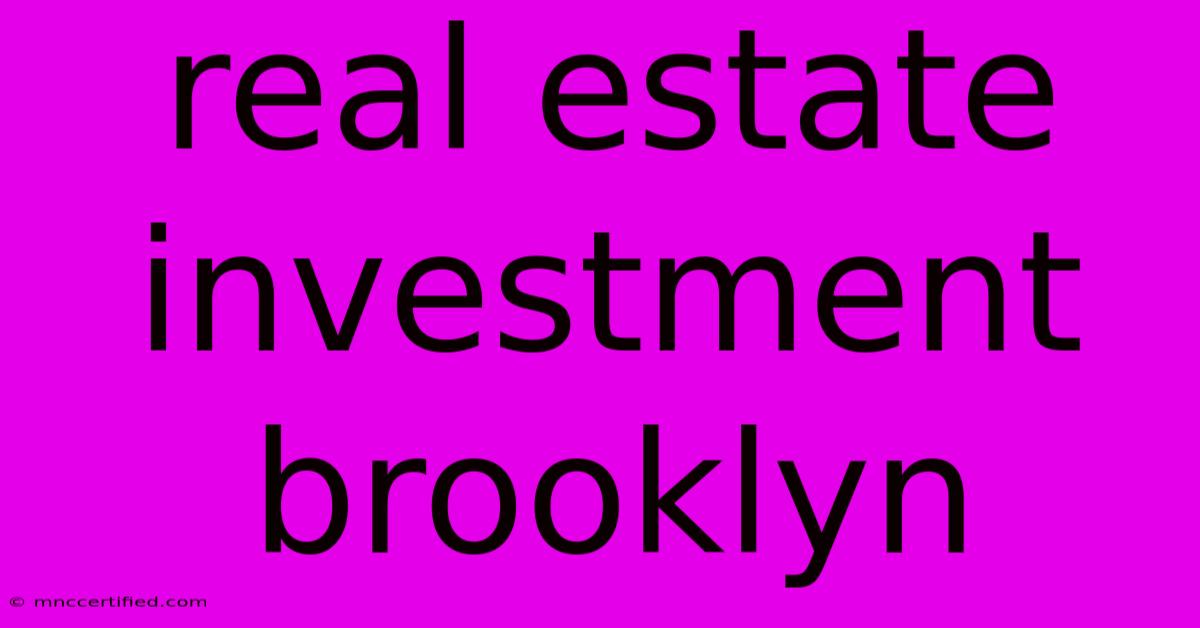Real Estate Investment Brooklyn

Table of Contents
Real Estate Investment in Brooklyn: A Comprehensive Guide
Brooklyn, a vibrant borough of New York City, has become a hotspot for real estate investment. Its unique blend of historic charm, burgeoning industries, and diverse neighborhoods offers a compelling mix of opportunities for both seasoned investors and newcomers. This guide will delve into the key aspects of real estate investment in Brooklyn, helping you navigate this dynamic market and make informed decisions.
Understanding the Brooklyn Real Estate Market
Brooklyn's real estate market is incredibly diverse, ranging from luxury brownstones in Park Slope to rapidly developing condo complexes in Downtown Brooklyn. This diversity presents a wide range of investment options, catering to various budgets and risk tolerances.
Neighborhood Analysis: Key Factors to Consider
Before investing, thorough neighborhood analysis is crucial. Consider these factors:
- Rental Demand: Research the rental market in your target area. High occupancy rates and strong rental yields indicate a healthy investment. Tools like Zillow, StreetEasy, and Apartments.com can provide valuable data.
- Property Values: Analyze historical and projected property value appreciation. Look at comparable sales (comps) to assess the market value of potential properties.
- Crime Rates: Safety is paramount. Research crime statistics for each neighborhood to understand the risk profile.
- Amenities and Infrastructure: Access to public transportation, schools, parks, and other amenities significantly impacts property value and rental demand.
- Future Development: Planned infrastructure projects, zoning changes, and new developments can influence property values dramatically. Stay informed about future plans.
Types of Brooklyn Real Estate Investments
Several investment avenues exist within Brooklyn's real estate market:
- Multi-Family Homes: Investing in multi-family properties offers potential for rental income and appreciation. Managing multiple units requires expertise, however.
- Condos and Co-ops: Condos offer more individual ownership while co-ops involve shared ownership and stricter rules. Both present opportunities for both rental income and capital appreciation.
- Commercial Real Estate: Investing in commercial properties like retail spaces or office buildings can yield high returns, but it typically requires significant capital and expertise in commercial leasing.
- Fixer-Uppers: Buying properties needing renovation allows for value-add opportunities. However, it demands time, resources, and construction knowledge.
Navigating the Investment Process
Investing in Brooklyn real estate requires a strategic approach. Here's a step-by-step guide:
1. Define Your Investment Goals and Budget:
Clearly outline your investment objectives (e.g., long-term appreciation, rental income, short-term flipping). Determine your budget, including down payment, closing costs, and potential renovation expenses.
2. Find a Reliable Real Estate Agent:
Partnering with a knowledgeable agent specializing in Brooklyn real estate is essential. They can provide valuable insights, market analysis, and assist in the negotiation process.
3. Secure Financing:
Obtain pre-approval for a mortgage to understand your borrowing power and streamline the purchasing process. Shop around for the best interest rates and loan terms.
4. Due Diligence:
Conduct thorough due diligence on any potential property, including inspections, title searches, and review of the property's history. Don't hesitate to consult with professionals like lawyers and engineers.
5. Negotiate and Close the Deal:
Negotiate the purchase price and terms effectively. Engage with a real estate attorney to ensure a smooth and legally sound closing process.
Potential Challenges and Risks
Investing in Brooklyn real estate isn't without its challenges:
- High Property Prices: Brooklyn's desirability translates to high property prices and a competitive market.
- Property Taxes: Property taxes in New York City can be substantial.
- Market Volatility: The real estate market can fluctuate, impacting property values and rental income.
- Maintenance and Repairs: Owning real estate requires ongoing maintenance and repairs, which can be costly.
Conclusion: Unlocking Brooklyn's Real Estate Potential
Real estate investment in Brooklyn offers significant potential for growth and profitability. By conducting thorough research, developing a well-defined investment strategy, and working with experienced professionals, you can increase your chances of success in this dynamic market. Remember, thorough due diligence and a realistic understanding of the risks are essential for navigating this exciting but challenging landscape. Always consult with financial and legal professionals to ensure your investment aligns with your financial goals and risk tolerance.

Thank you for visiting our website wich cover about Real Estate Investment Brooklyn. We hope the information provided has been useful to you. Feel free to contact us if you have any questions or need further assistance. See you next time and dont miss to bookmark.
Featured Posts
-
Trading Card Game Carrying Case
Nov 26, 2024
-
Loss Of Use Car Insurance Claim
Nov 26, 2024
-
Shell E Commerce And Trading In
Nov 26, 2024
-
Adeles Final Vegas Residency Farewell
Nov 26, 2024
-
Aj Finley Tampa Bay Bolts Release
Nov 26, 2024